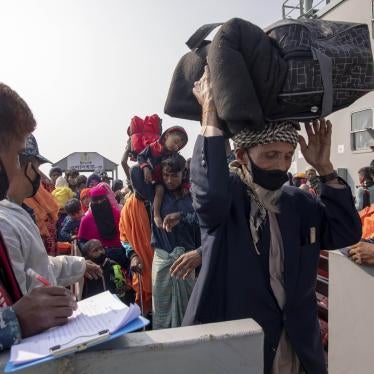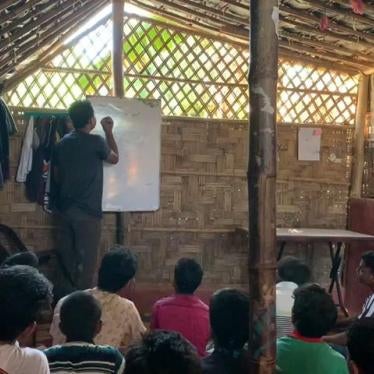November 1, 2021
Re: Humanitarian response for Rohingya refugees in Bangladesh
Dear Ambassador,
We are writing on behalf of Human Rights Watch regarding your government’s upcoming considerations on funding commitments to the Rohingya refugee response in Bangladesh. In October, the United Nations High Commissioner for Refugees (UNHCR) signed a Memorandum of Understanding (MoU) with the Bangladesh government, establishing a framework for UN support for refugee operations on the island of Bhasan Char.
Human Rights Watch has been working on the protection of refugee rights for over three decades. We have extensively documented Myanmar’s abuses against ethnic Rohingya, including the 2017 crimes against humanity and acts of genocide that led to over 750,000 Rohingya fleeing across the border. Bangladesh now hosts nearly a million Rohingya refugees who are being supported through the Joint Response Plan for the Rohingya Humanitarian Crisis, which has raised US$2.75 billion since August 2017.
Bangladesh authorities have relocated nearly 20,000 Rohingya refugees to the remote, flood-prone island of Bhasan Char, claiming the relocations are necessary to ease the overcrowding in the Cox’s Bazar camps. Many refugees were transferred to the island without full, informed consent, and have been prevented from returning to the mainland. Once on Bhasan Char, they have faced severe movement restrictions, food shortages, abuses by security forces, and inadequate education, health care, and livelihood opportunities.
Bangladesh is eager to have UNHCR begin operations on the island. While the recent agreement opens the door to a UN presence on Bhasan Char, serious concerns remain regarding the island’s safety as well as the mechanisms through which fundamental principles such as informed consent and freedom of movement will be upheld.
We welcome your government’s ongoing support for the humanitarian response to the Rohingya crisis in Bangladesh. We urge that the government uses its economic, diplomatic, and political standing to ensure that no further relocations take place until conditions on the island are established that fully uphold the refugees’ rights.
Below, we have outlined benchmarks on which your government should condition any potential funding commitments to Bhasan Char.
Free, informed consent. The MoU asserts that relocations to Bhasan Char will take place on a “voluntary basis” and that refugees will be provided with “accurate and timely information about the conditions” on Bhasan Char before making the decision to relocate there. No details have been worked out, however, for how refugees will be identified, what information will be provided to them, and what other measures will ensure their decisions are fully informed and voluntary. Human Rights Watch is concerned about reports that Bangladesh has already identified an additional nearly 900 families it intends to relocate, contravening the agreement with UNHCR. Donors should insist that no relocations take place until UNHCR has developed a process for ensuring informed consent. Such process should include individually counseling and receiving informed consent from every adult being relocated to Bhasan Char, with measures to prevent discrimination against women, older people, people with disabilities, and other people with specific needs and vulnerabilities.
Freedom of movement to travel outside of Bhasan Char. The MoU leaves the arrangements for movement between Bhasan Char and the mainland camps vague, only indicating that such movement will be restricted on an unspecified “needs basis.” Such language raises concerns that, in practice, the status quo policy will remain, which has already had a deadly impact. Refugees currently require a series of extensive permissions to leave the island, even in case of medical emergency, a lengthy process that has in some instances delayed access to urgent care and led to preventable deaths. Denied the right to return to the mainland to visit their families, refugees on Bhasan Char describe feeling like they live on a “prison island.” They are unable to attend family events or funerals, visit sick relatives, or get married. Hundreds have attempted to escape, some even drowning in the process, while those caught are detained and beaten. Donors should ensure that existing movement restrictions are abolished. Refugees’ rights to change their mind and move back to the mainland if they choose are essential to realizing commitments to voluntary relocation. A mechanism should be developed to provide effective remedy to Rohingya refugees on Bhasan Char, including by urgently allowing any who wish to return to Cox’s Bazar to do so and by providing restitution to those who were forcibly relocated.
Freedom of movement on Bhasan Char. The agreement allows for movement within Bhasan Char “for their daily activities,” language that does not preclude authorities from maintaining existing restrictions or imposing new directives to limit refugees’ movement around the island. People, even children, have been beaten for visiting relatives in another cluster. Donors should urge Bangladesh to abolish existing movement restrictions, including barbed wire fencing, confinement to specific clusters, and arbitrary and prohibitive permission procedures. Funding should be withheld until full freedom of movement around the island is enshrined in policy and in practice.
Technical assessment. The MoU provides that Bangladesh will establish emergency response planning and disaster reduction measures with UN support but does not lay out a framework for UNHCR and other UN agencies and experts to carry out technical assessments of the island’s safety or habitability. Experts have raised concerns that the government has failed to construct sufficient protection against severe cyclones and tidal surges. Donor support should be conditioned on an independent technical assessment of the safety, disaster preparedness, and habitability of the island. This technical assessment should be made public.
Protection. The MoU does not guarantee refugees protection from arrest or detention for attempting to leave Bhasan Char or in other situations. It grants the UN “unhindered access” to refugees but does not specify whether that includes those detained by the authorities. Both principles should be enshrined in follow-up agreements and monitored closely. Donors should urge the Bangladesh government to allow the UN to conduct a protection mission to the island, including interviews without the presence of authorities, visits to police and detention facilities on the island, and access to all those who have been detained following attempts to leave the island or the main camps. All refugees held on Bhasan Char after being rescued at sea should be promptly reunified with their families in Cox’s Bazar.
Access to health care, education, and livelihoods. The MoU asserts refugees will have access to a “comprehensive package of essential health services”; education in Burmese language and eventually under the Myanmar curriculum; “uninterrupted telecommunications services”; and livelihood activities. Much of this language echoes the false promises Bangladesh authorities made to entice refugees to Bhasan Char over the past year. Bangladesh authorities increasingly cracked down on refugees who spoke out on these issues or attempted to leave the island. The technical implementation of these principles should be monitored closely. Before committing funding, donors should ensure that authorities have demonstrated clear plans to establish quality healthcare services for refugees on Bhasan Char, including operationalizing all medical facilities with adequate staffing and supplies, diagnostic services, and emergency care and transport procedures. There also needs to a clear plan to ensure quality food security, including during extreme weather conditions such as cyclones.
Monitoring. Given the generality of the MoU, monitoring the implementation of its principles and any follow-up action plans will be crucial to ensure any future relocations do not follow the same harmful path as those that have taken place thus far. Refugees told Human Rights Watch that, during a UN visit in March, they were only allowed to speak to UN officials in the presence of Bangladesh authorities and were coerced to provide positive accounts. The UN, other implementing agencies, and donors should have full access to monitor the situation to ensure the above principles are implemented, particularly Bangladesh’s commitment to voluntary relocations, and provide transparency and accountability by publicly reporting on the progress of the MoU. Donors should call for the establishment of a UNHCR field office on the island to allow for 24/7 monitoring and protection.
With Bangladesh eager to move an additional 100,000 refugees to Bhasan Char, this is a crucial moment to weigh in on the urgent human rights and humanitarian risks this community is facing. We urge you to use your influence to take a strong, vocal stand to ensure that Rohingya refugees are protected, and their rights upheld.
We welcome the opportunity to discuss these matters further at your convenience. Thank you for your consideration.
Sincerely,
Brad Adams
Asia Director
Bill Frelick
Refugee and Migrant Rights Director








